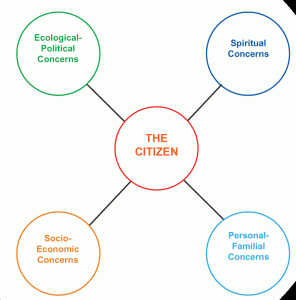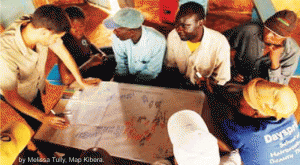Is it possible to engage each and every human on the planet as a stakeholder? Is it possible to make every single voice count? Is it possible to get all citizens on board to arrive at decisions that are relevant to the entire population?
The answer is: YES. A resounding, no dream, all hard fact ‘yes!’.
It is possible, in this day, to create a super democratic system that engages every individual concerned with an enterprise, counts their voice, marks their presence, and assigns them tasks. It is possible to end the problem of disenfranchisement. It is possible to engage the citizen as a stakeholder.
The Citizen Stakeholder
Any modern organization – be it a public service body, the government, a corporation, or a non-profit organization – has theoretically always factored in ‘the common person’ as a stakeholder.
In truth, however, that has not been possible due to the technical limitations of engaging every single person. That technical inability has led to two kinds of intents:
- The everyday stakeholder is deliberately kept out, and control is exerted by the few.
- There is a willingness to engage the common person, but the process has been long, frustrating, and at best helped by scientific methods of sampling (with constant corrections for bias).
- Let us name this common person as ‘the citizen’. When the citizen is kept out of the creation process, whether deliberately or not, two possible outcomes occur:
- Costs are passed on to the citizen. The citizen has not accepted to take on these costs – and each project has costs until a perfect sustainability is achieved. The citizen is neither equipped nor ready to take on unexpected negative outcomes – such as, the cleanup required after a civil construction project.
- Possible value addition – that comes through the input of the citizen collective is missed. For instance, the citizen could suggest that all new area houses have storage to harvest rainwater. It’s good value for the individual household, who may altogether ‘miss’ the opportunity to create this value through a lack of knowledge or motivation. In another scenario, positive externalities are not acknowledged or credited. For instance, a business organization may not be credited for care shown to employee families; with accountability’s focus on profits alone. In this case, the organization finds little motivation to do the right thing.
Externalities
“In economics, an externality (or transaction spillover) is a cost or benefit, not transmitted through prices, incurred by a party who did not agree to the action causing the cost or benefit. A benefit in this case is called a positive externality or external benefit, while a cost is called a negative externality or external cost. For example, manufacturing that causes air pollution imposes costs on the whole society, while fire-proofing a home improves the fire safety of neighbors.”
Wikipedia
A Portfolio of Concerns
There is an upside to having the citizen stakholder on board: the citizen does not have just one concern or interest. Rather, there is a ‘portfolio of concerns’. At any given time, the ‘pull’ on the citizen comes from various directions: the belief system, the family structure, the social network, the economic activity, and the larger political world.

Once an organizational structure is imposed, however, the person starts to lean towards the biases of the organization. Hence, in a worst case scenario, a person in a not so responsible corporation does not concern themselves with the environmental impact of economic activity, and a person in an environmental preservation NGO does not concern themselves with its impact on business and livelihood. This scenario has often been played out in real life. Consider Green-peace vs. The Corporation.
On the other hand, the person as a citizen is blessed with a complex eye that sees more than one concern. Collectively, aware and empowered citizens have the ability to diffuse special interests – in other words, no single agenda dominates permanently at the expense of others. When it does, contrarian forces emerge until balance is restored.
TECHNOLOGY IN CASE: USHAHIDI
In the wake of the 2007 Kenyan post-election crisis, a web-based platform, UShahidi (Swahili for “witness” or “testimony”) was created to generate incident reports from the public. The hallmark of UShahidi was the ability of the public to report incidents through SMS. The incidents would be classified in categories, and mapped visually for public viewing. The project was a great success.
Today, UShahidi’s open, free platform is deployed for various purposes ranging from snow cleanup in the USA (snowmageddon.com) to identifying peace heroes in Kenya (peaceheroes.ushahidi.com).
Kibera: Africa’s Largest Slum
In the Kenyan slums of Kibera a community ridden with typical slum issues, and long a laboratory for NGOs and activists UShahidi has found a new purpose: digitally mapping the community.
Led by Map Kibera, young Kiberans are creating a thematic digital map ‘Voice of Kibera’ (kibera.ushahidi.com). Key themes include Health, Security, Education, and Water/Sanitation. In their own words:
“Map Kibera is, at the core, about empowering communities to use technology for their own agenda, all players openly sharing and creating information for transparency and equitable discussion, and confronting the reality of technology on the ground, in marginalized communities.”- mapkibera.org

Kiberian citizen journalists equipped with cameras and mobiles are the eyes and ears of the Map Kibera project
The idea: once the community’s resources (corresponding to its issue – health, etc.) are mapped, a better picture will emerge that will better enable organizing for social change and informed decision-making. It also brings the community together around issues that matter to the collective, reducing disruptions along the way.
Pakistan: An Unorganized Global Powerhouse
Closer to home, Pakistan Changemakers Hub (http://changemakers.pk) is deploying UShahidi to create a platform where the Change makers innovators and community leaders of Pakistan can be mapped, organized by their field of action. The end result is a citizen-generated visual directory very similar to Voice of Kibera.
The idea: connect the disconnected Changemakers in order to accelerate Change. The directory serves the functional purposes of making hidden Changemakers known and available. Its more subtle function is coordination, hope, connection, motivation. It organizes Pakistanis causes we care for rather than identities that divide us.
FINAL QUESTION:DO CITIZENS CARE?
Yes. What they need is a direction and a method to organize the chaos. Globally, we’ve witnessed citizens organizing for Tsunami relief, Haiti, and recently, against BP’s handling of the oil spill. In Pakistan, the ‘civil society’ has risen in (near) concert during the 2005 Earthquake and the 2007 political unrest.
The underlying theme, however, in all these cases is accident. The question, can creative projects create the same kind of momentum? The part of the answer that comes from technology and abi-lity is: yes. The part of the answer that comes from will is: up to you.







We have consolidated a list and are constantly updating it. For details on how to donate via
SMS, watching YouTube videos, purchasing charity songs, on-line campaigns, and individuals and organisations working for Pakistan Flood Relief, please visit:
http://tinyurl.com/36seelg
Amiable dispatch and this post helped me alot in my college assignement. Thank you for your information.
Great information! I?ve been looking for something like this for a while now. Thanks!
This is such a great resource that you are providing and you give it away for free. I enjoy seeing websites that understand the value of providing a prime resource for free. I truly loved reading your post. Thanks!